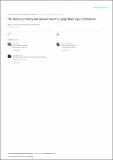The neurochemistry and social flow of singing: bonding and oxytocin.

View/
Date
2015-09-23Author
Keeler, Jason
Roth, Edward
Neuser, Brittany
Spitsbergen, John
Waters, Daniel
Vianney, John-Mary
Metadata
Show full item recordAbstract
Music is used in healthcare to promote physical and psychological well-being. As clinical applications of music continue to expand, there is a growing need to understand the biological mechanisms by which music influences health. Here we explore the neurochemistry and social flow of group singing. Four participants from a vocal jazz ensemble were conveniently sampled to sing together in two separate performances: pre-composed and improvised. Concentrations of plasma oxytocin and adrenocorticotropic hormone (ACTH) were measured before and after each singing condition to assess levels of social affiliation, engagement and arousal. A validated assessment of flow state was administered after each singing condition to assess participants' absorption in the task. The feasibility of the research methods were assessed and initial neurochemical data was generated on group singing. Mean scores of the flow state scale indicated that participants experienced flow in both the pre-composed (M = 37.06) and improvised singing conditions (M = 34.25), with no significant difference between conditions. ACTH concentrations decreased in both conditions, significantly so in the pre-composed singing condition, which may have contributed to the social flow experience. Mean plasma oxytocin levels increased only in response to improvised singing, with no significant difference between improvised and pre-composed singing conditions observed. The results indicate that group singing reduces stress and arousal, as measured by ACTH, and induces social flow in participants. The effects of pre-composed and improvised group singing on oxytocin are less clear. Higher levels of plasma oxytocin in the improvised condition may perhaps be attributed to the social effects of improvising musically with others. Further research with a larger sample size is warranted.
